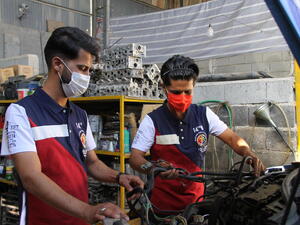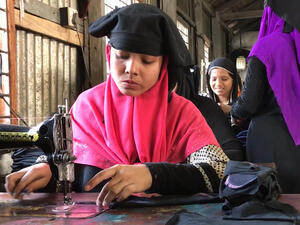Accounting for Afghans in Pakistan
Accounting for Afghans in Pakistan

An Afghan graduate receives his certificate from the Afghan Ambassador to Pakistan, Mohammad Anwar Anwarzai, while UNHCR's Senior Protection Officer, Beat Schuler, looks on.
ISLAMABAD, Pakistan, July 29 (UNHCR) - Wahidullah Naseri was very happy to be in Pakistan again, this time not as a refugee but as a professional.
Born in Pakistan's North-West Frontier Province, he had spent his first 16 years as an Afghan refugee in Peshawar before repatriating to Afghanistan in 2002. He returned to Islamabad last week to attend his graduation ceremony for accountancy under a programme run by the Association of Chartered Certified Accountants (ACCA), the global body for professional accountants with a base in Pakistan. The 22-year-old was part of the first batch of 13 Afghan graduates to receive their certificates for Certified Accounting Technicians (CAT).
"During the war, millions of Afghans fled their country, which caused a lack of educated human resources in our country," said Feroz Rafiq, the President of the Afghanistan Society for Accounting Technicians (ASAT), at the ceremony. "Today, we have a number of expatriates who are working in different parts of Afghanistan but we would like to see local boys and girls take up key roles in business and industry."
With billions of dollars in aid to Afghanistan, international donor agencies have also raised concerns about the sustainability of development and other projects in Afghanistan due to the lack of trained accounting professionals and structured accounting processes. Professional training could help to fill this gap.
"The field of accounting is still in its early stages in Afghanistan. Much needs to be done to bring professionalism into this sector, which is one of the reasons I chose this course," said Naseri. The former refugee is now a finance manager at Ariana Financial Services in Kabul, which provides micro-credit mostly to groups of women who run small businesses in Kabul and Jalalabad.
"I am very pleased with ACCA, as I feel that it offers an updated curriculum and provides good support to the students," said fellow graduate Khaild Zarif, who works at the Sayed Jafar Sadat Bank in Afghanistan. "Qualifying for CAT has not only helped me in understanding financial statements, but also given me enough confidence to conduct auditing."
Mohammad Anwar Anwarzai, the Afghan Ambassador to Pakistan, was the chief guest of the graduation ceremony. "The growing need for transparency requires more professionals," he said. "I am grateful to ACCA for addressing these needs ... for their commitment in providing qualification of international repute to the young citizens of Afghanistan. We are living in a global village where financial planning and corporate governance are an essential part and Afghanistan is a part of this global village."
According to Arif Masud Mirza, Head of ACCA Pakistan, the association supports ACCA offices and projects in South and Central Asia, including in Afghanistan. Teachers and students from the region are often invited to Pakistan to take part in seminars, and vice versa.
The benefits are mutual. "Afghan students understand the culture of Pakistan, its language and values. The reverse is also true. It is therefore a privilege to host the graduation ceremony for these graduates in Pakistan," said Mirza. "It is also gratifying to know that they are all working in middle or higher management positions in renowned local and global organisations, and are now our brand ambassadors."
More than 3.4 million Afghans have voluntarily repatriated from Pakistan to Afghanistan with UNHCR assistance since 2002. Some 1.8 million registered Afghans remain in Pakistan today.
By Asif Shahzad in Islamabad, Pakistan









